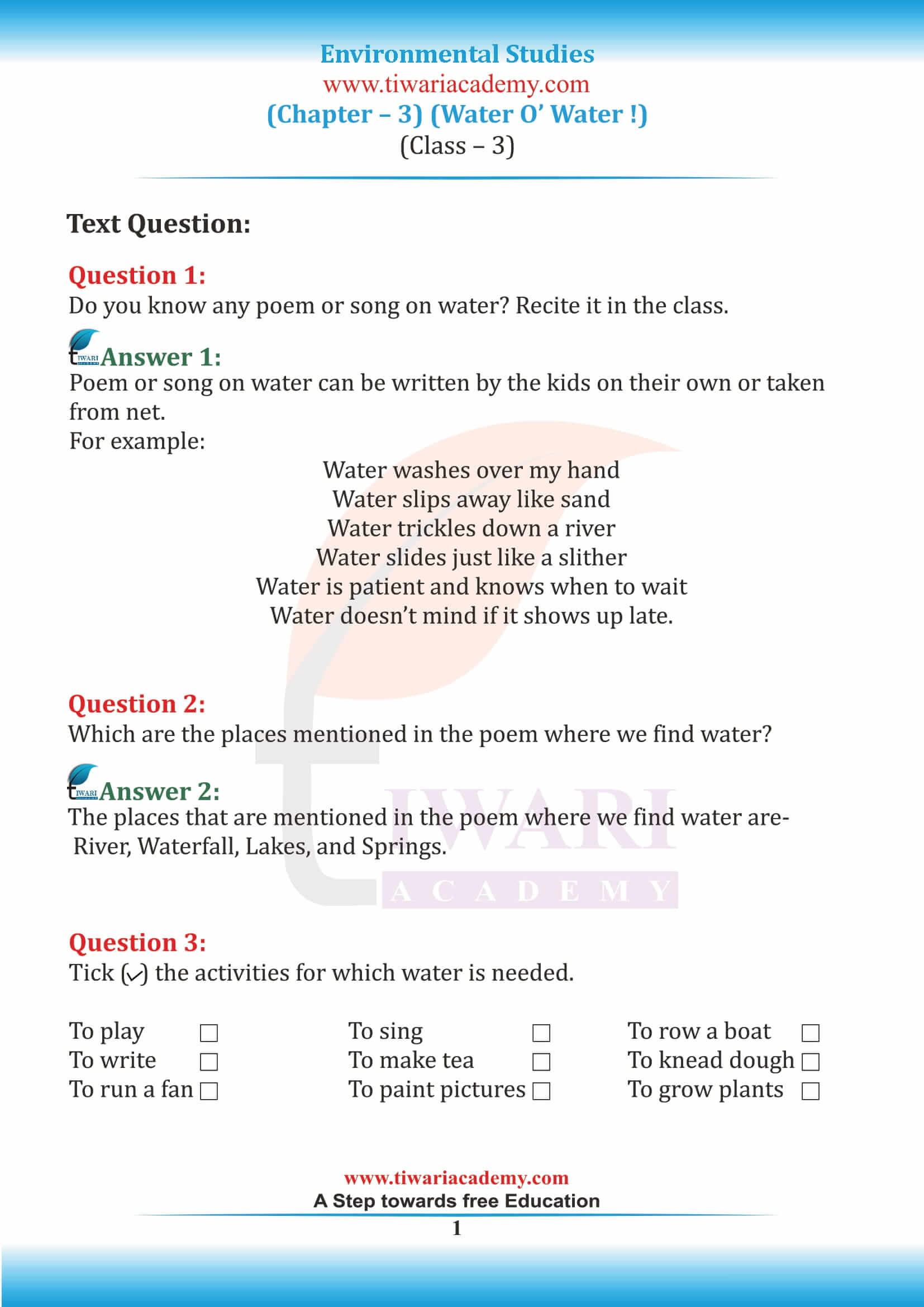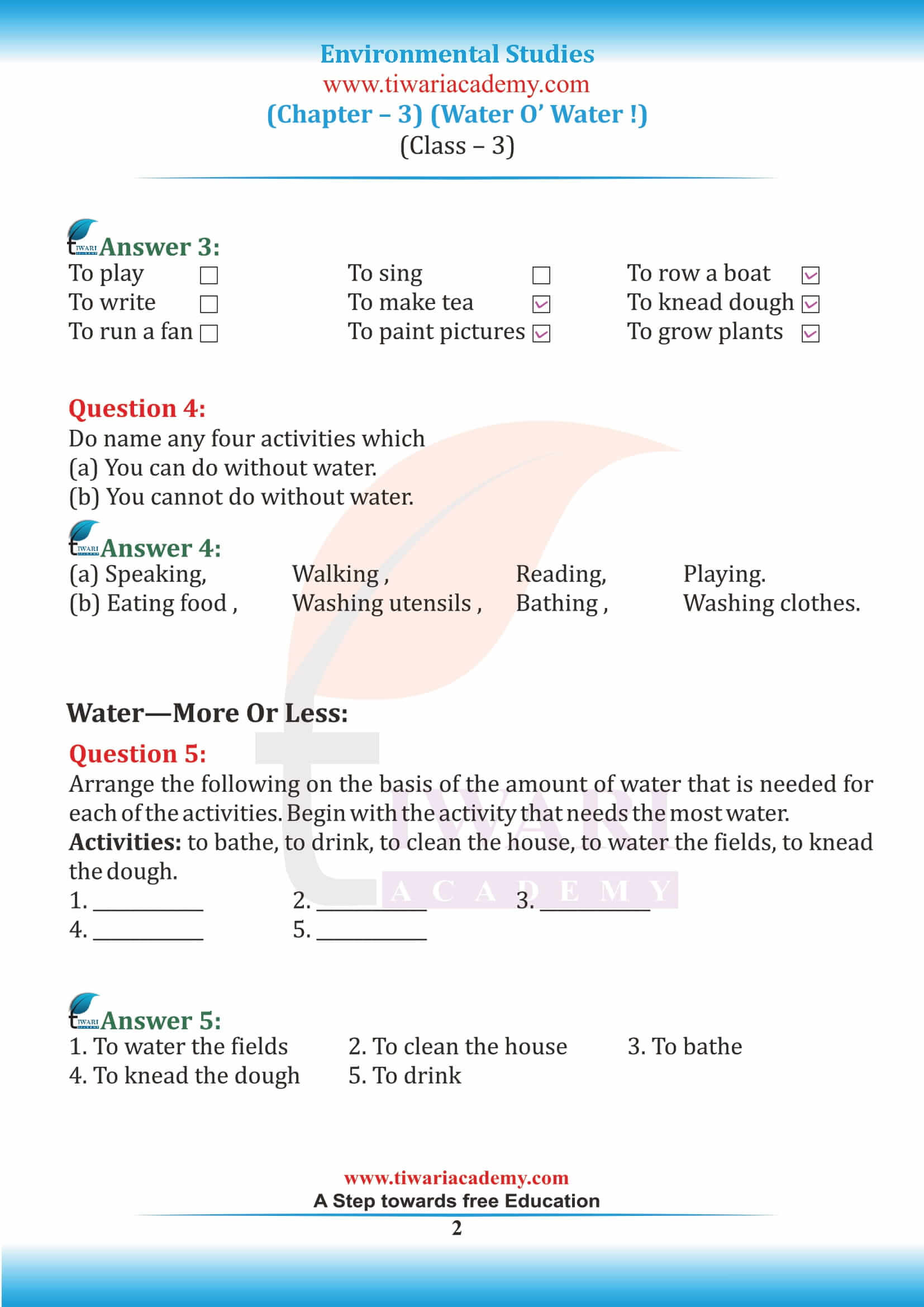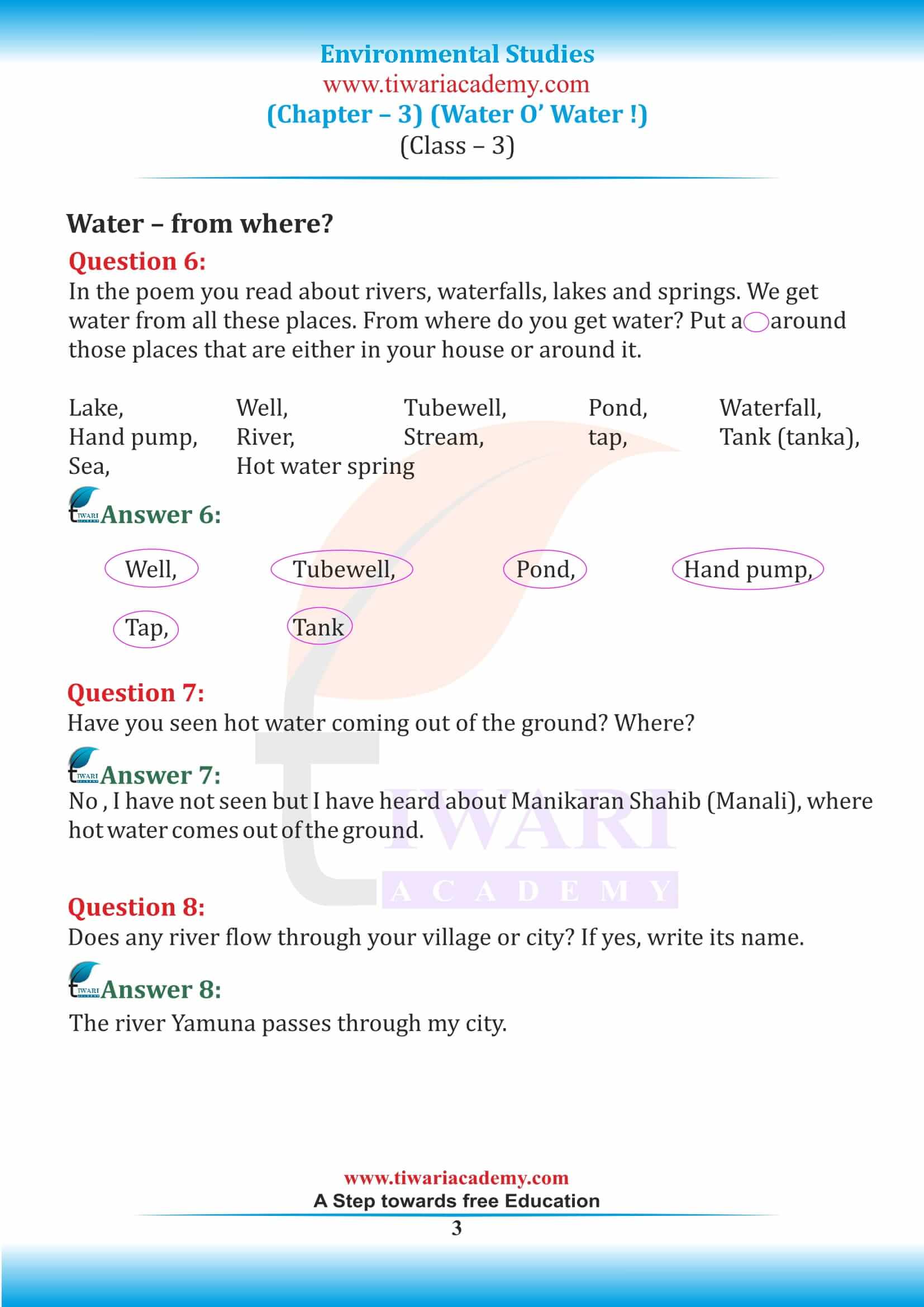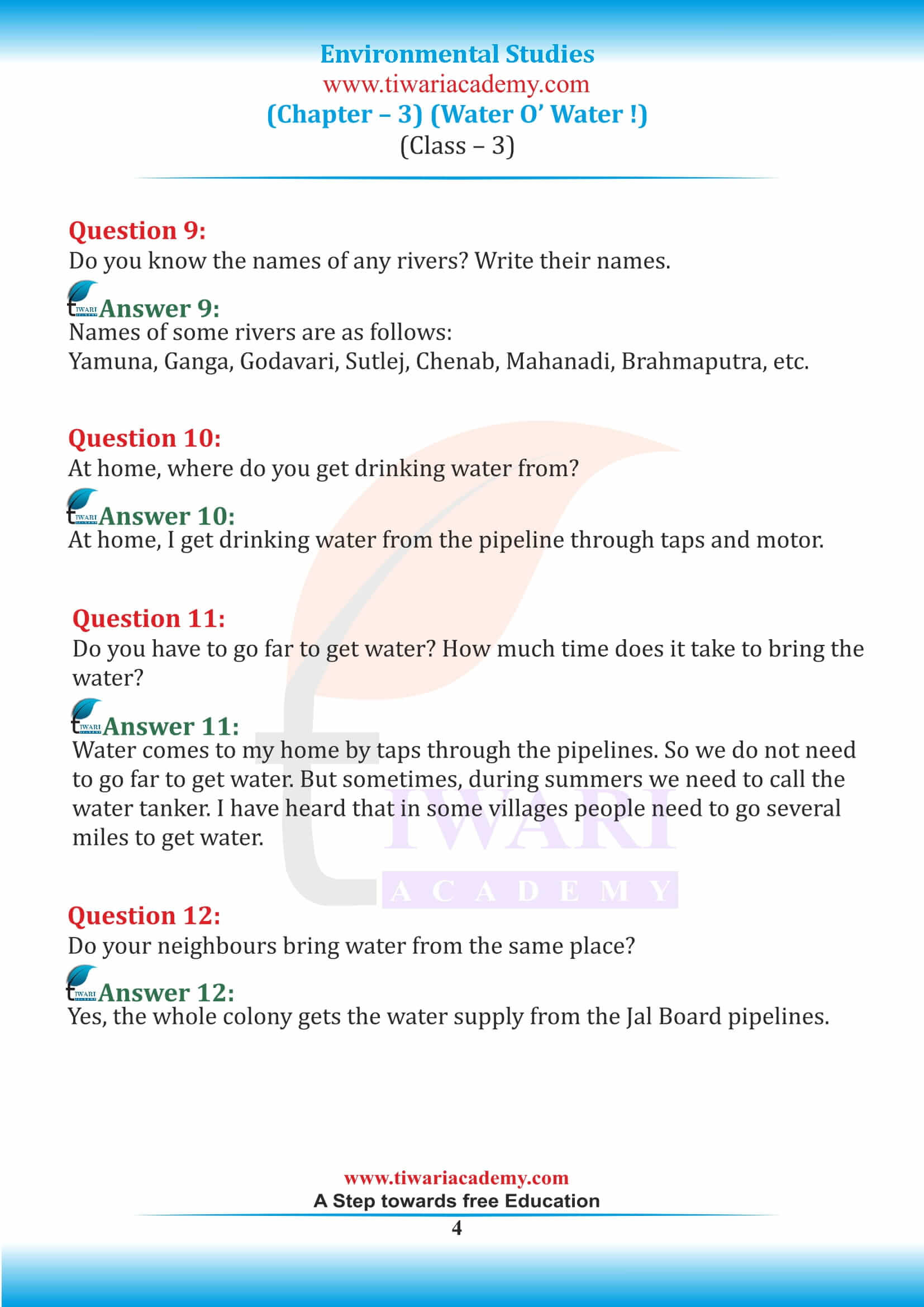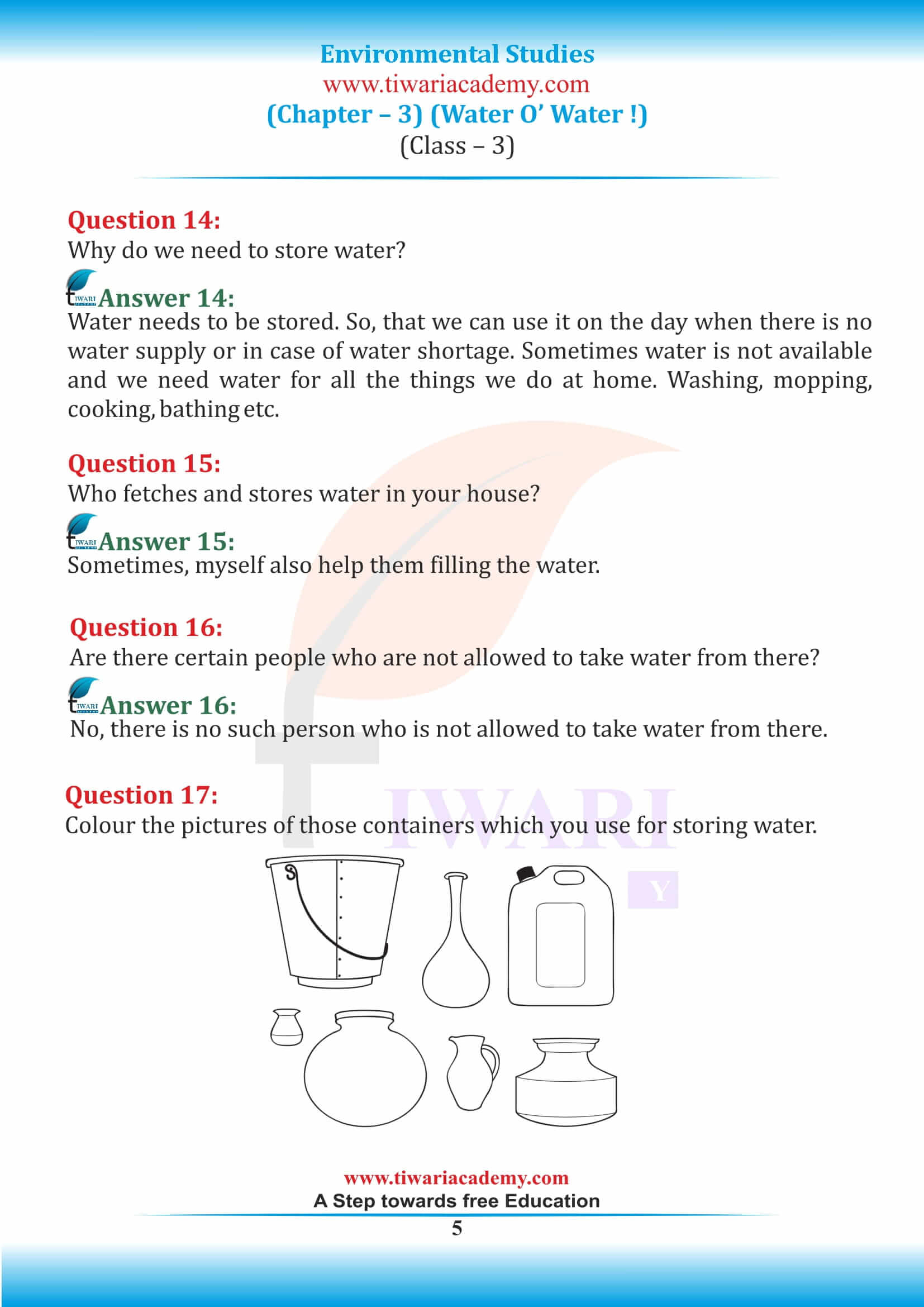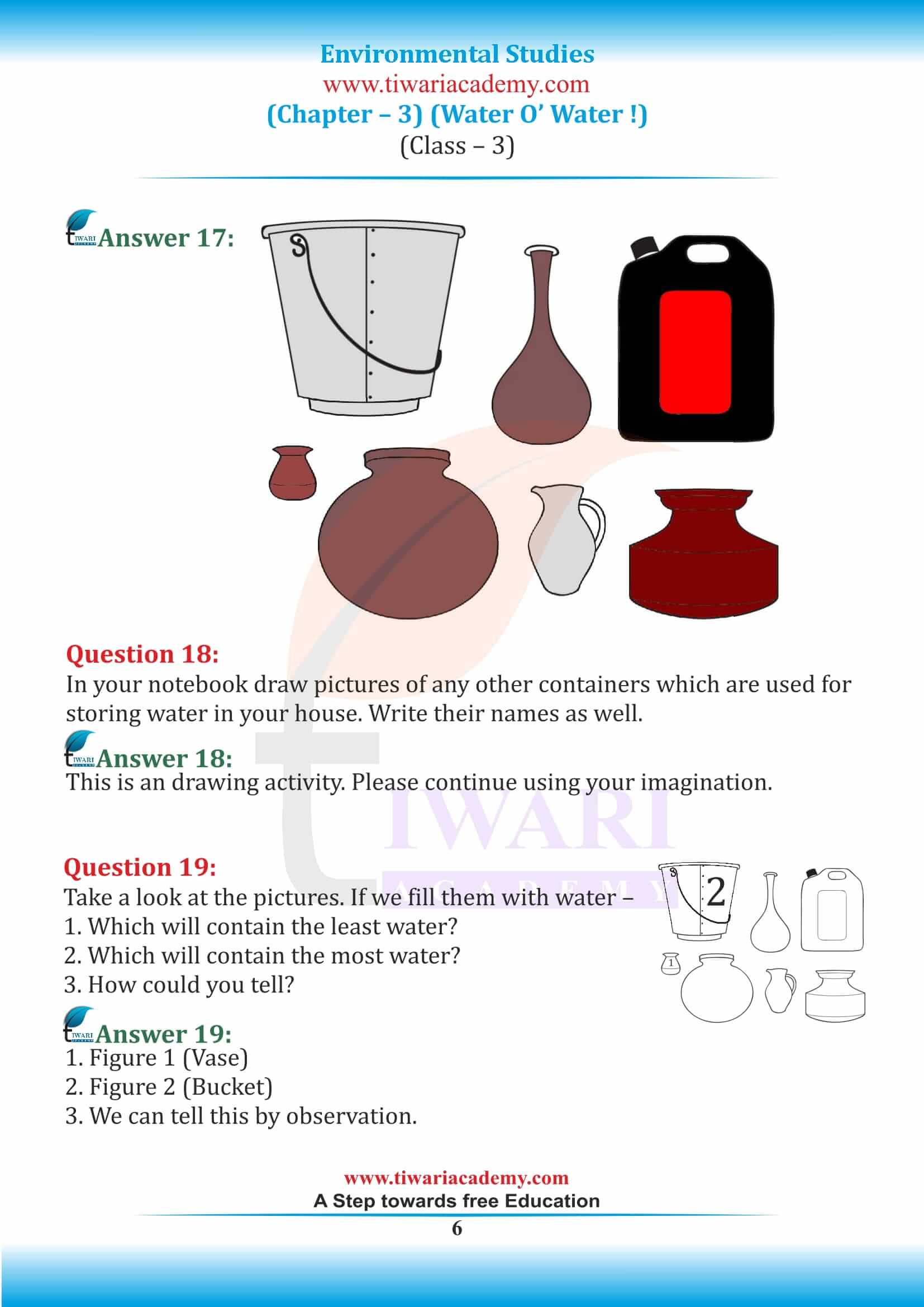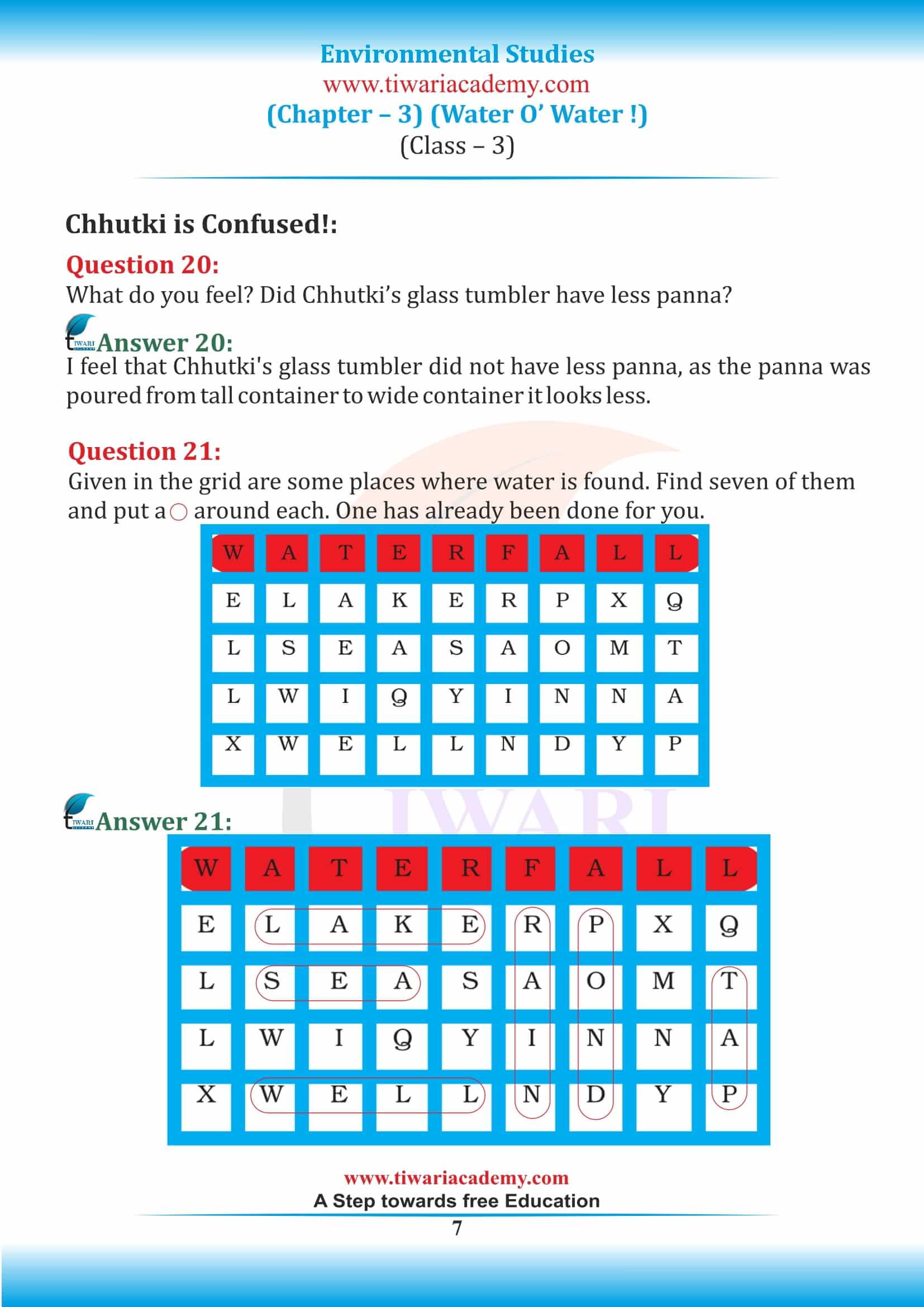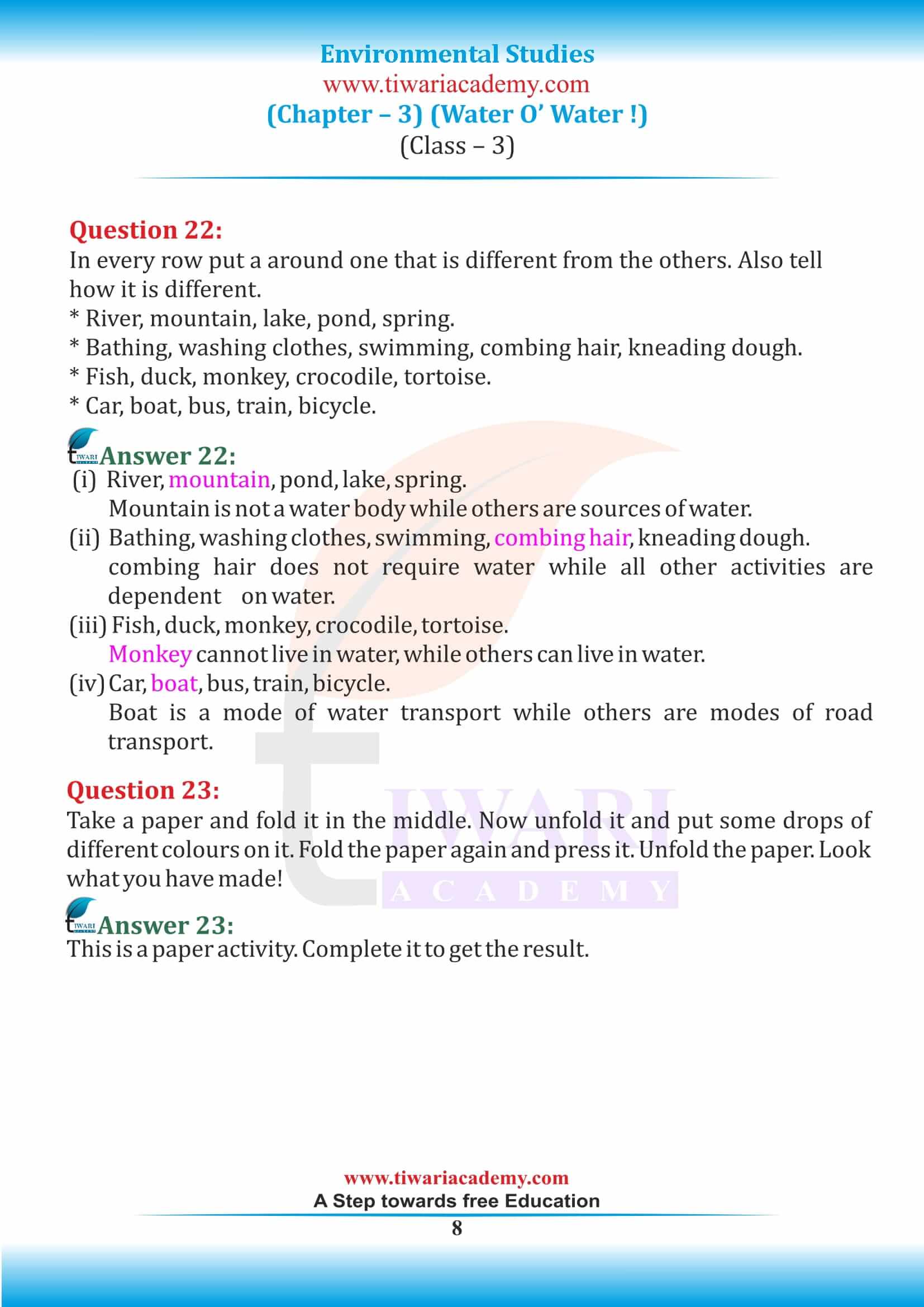NCERT Solutions for Class 3 EVS Chapter 3 Water O’ Water in English and Hindi Medium solution all answers from NCERT Book Environmental Studies Looking Around for CBSE 2025-26. Questions based on Chapter 3 of 3rd EVS are answered in Hindi and English Medium to use free online or download in PDF file format. Class 3 EVS Chapter 3 aware about the various importance of water and its uses. It also tells us how the water is one of the precious things in our life.
NCERT Solutions for Class 3 EVS Chapter 3
NCERT Solutions for Class 3 EVS Chapter 3 Water O Water
Class 3 EVS Chapter 2 Question and Answers
Do you know any poem or song on water? Recite them in the class.
Poem or song on water can be written by the kids on their own or taken from net
Water washes over my hand
Water slips away like sand
Water trickles down a river
Water slides just like a slither
Water is patient and knows when to wait
Water doesn’t mind if it shows up late.
Which are the places mentioned in the poem where we find water?
The places that are mentioned in the poem where we find water are:
River, Waterfall, Lakes, and Springs.
Tick the activities for which water is needed To play, to sing, to row a boat, to write, to make tea, to knead dough, to run a fan, to paint pictures, to grow plants.
The activities for which water is needed are:
To row a boat, To Knead dough, to paint pictures, to grow plants
Name any four activities which: (a)You can do without water. (b)You cannot do without water.
(a) Speaking, Walking ,Reading, Playing.
(b) Eating food ,Washing utensils ,Bathing ,Washing clothes.
Water—More or Less
Arrange the following on the basis of the amount of water that is needed for each of the activities. Begin with the activity that needs the most water. Activities—to bathe, to drink, to clean the house, to water the fields, to knead the dough.
1.——————- 2. ——————- 3. ——————-
4.——————- 5. ——————-
1. To water the fields 2. To clean the house 3. To bathe 4. To knead the dough 5. To drink.
Water—From Where?
In the poem you read about rivers, waterfalls, lakes and wells. We get water from all these places. From where do you get water?
Put a 0 around those places that are either in your house or around it.
lake ,well ,tube well, pond, waterfall, hand pump, river, stream, tap, tank, sea, hot water spring.
1. Tubewell
2. Tank
3. Well
4. Pond
5. Handpump
6. Tap
Have you seen hot water coming out of the ground? Where?
No, I have not seen but I have heard about Manikarnika Ghat, where hot water comes out of the ground.
Does any river flow through your village or city? If yes, write its name.
The river Yamuna passes through my city.
Do you know the names of any rivers? Write their names.
Names of some rivers are as follows: Yamuna, Ganga, Godavari, Sutlej, Chenab, Mahanadi, Brahmaputra, etc.
At home, where do you get drinking water from?
At home, I get drinking water from the pipeline through taps and motor.
Do you have to go far to get water? How much time does it take to bring the water?
Water comes to my home by taps through the pipelines. So we do not need to go far to get water. But sometimes, during summers we need to call the water tanker. I have heard that in some villages people need to go several miles to get water.
Do your neighbours bring water from the same place?
Yes, the whole colony gets the water supply from the Jal Board pipelines.
Are there certain people who are not allowed to take water from there?
No, there is no such person who is not allowed to take water from there.
Why do we need to store water?
Water needs to be stored so that it can be used if there is no water supply or there is shortage of water . Sometimes no water is not available and we need water for almost all the things we do at home like washing, mobbing, cooking, bathing etc. so storing water can be useful at that particular time.
Who fetches and stores water in your house?
My parents fill water in turns, sometimes my mother does it and sometimes my father. Sometimes I also help them in filling the water.
Chhutki is Confused
What do you feel? Did Chhutki’s glass tumbler have less panna?
I feel that Chhutki’s glass tumbler did not have less ‘panna as the panna was just poured from one container to another.
In every row put an around one that is different from the others. Also tell how it is different.
♦ River, mountain, lake, pond, spring.
♦ Bathing, washing clothes, swimming, combing hair, kneading dough.
♦ Fish, duck, monkey, crocodile, tortoise.
♦ Car, boat, bus, train, bicycle.
i. River, mountain, pond, lake, spring. Mountain is not a water body while others are sources of water.
ii.Bathing, washing clothes, swimming, combing hair, kneading dough. Combing hair does not require water while all other activities are dependent on water.
iii. Fish, duck, monkey, crocodile, tortoise. Monkey cannot live in water, while others can live in water.
iv. Car, boat, bus, train, bicycle. Boat is a mode of water transport while others are modes of road transport.
Class 3 EVS Chapter 3 Extra Questions Set 1
It is important to drink clean drinking water as: i. It is free of germs ii. It keeps us safe from diseases caused by drinking contaminated water. iii. It is very tasty iv. It has lot of nutritive values in it
Water is important for the ……………………. all the living beings.
Which of the following is a main source of water?
Drinking water should be stored in:
A plant that can survive without water for many days is _________.
Class 3 EVS Chapter 3 Extra Questions Set 2
Water of ………….and ………………. is unfit for drinking and human consumption.
Plants need water to:
Underground water is the water which-
Aquatic animals and plants are those who live:
Why do we need to store water?
We need to store water so that:
i. It can be used when water supply is unavailable.
ii. If your local water source becomes polluted or contaminated, then it can be used.
iii. We need to store water so that it is available easily for consumption when there is no direct supply of water.
How can we use underground water?
We can use underground water by digging wells and tube wells or by using hand pumps. Groundwater supplies drinking water for the population. Groundwater helps us to grow our food. 64% of groundwater is used for irrigation to grow crops. Groundwater is an important component in many industrial processes.
How is water useful to us?
Water is useful to us in the following ways:
• It is used in homes for drinking, cooking food, washing utensils, bathing, and domestic purposes.
• It is used in agriculture for growing food.
• It is used in industries for the manufacture of different products.
• It is used seas and rivers for transport purposes.
• It is used in the dispersal of seeds.
• It is used to generate electricity.
What are the three forms of water?
Water can occur in three states: solid (ice), liquid and gas (vapour).
• Solid water – ice is frozen water in the form of ice.
• Liquid water is wet and fluid.
• Water as a gas – vapour is always present in the air around us.
What are the properties of water?
The properties of water are that it:
i. Has no taste, colour or smell
ii. Exists in three states- solid, liquid and gas
iii. Is a solvent as many things dissolve in it
iv. does not have any shape. It takes the shape of the container it is poured in.
Where do we find water?
The different sources of water are seas and oceans, fresh water, ground water, snow and ice.
i. Seas and oceans- Saline water also called salt water is water which has a high amount of salt in it. Almost all the water on the Earth is in seas and oceans and is saline.
ii. Fresh water- The water available in streams, rivers and lakes forms the fresh water. It contains only minimum quantities of dissolved salts. All freshwater comes from Precipitation of water vapour present in the air which reaches the inland lakes, rivers
iii. Snow and ice- Water freezes and becomes snow and ice in cold weather. Only 2.5–2.75% is fresh water, including 1.75–2% frozen in glaciers, ice and snow
iv. Ground water- Groundwater is the water that is present below the earth’s surface and is a vast resource of water. Almost 22 percent of water is below the surface land in the form of groundwater. Groundwater returns to the surface again through springs and rivers.
What is water cycle?
The water cycle is the continuous movement of water within the Earth and atmosphere. The liquid water evaporates into water vapour, then it condenses to form clouds, and when the clouds become heavy and are unable to control water in them, they precipitate back to earth in the form of rain and snow. Water in different phases moves through the atmosphere. Thus, water cycle includes four process, evaporation, condensation, precipitation and collection.
Why should we save water?
Living organisms need water to maintain the balance in their bodies. We also use water for cooking, cleaning, washing, etc every day in our home. It is also used for different processes in the factories for making goods. Water is also used for growing crops and other food sources. So water is an essential thing required by us to survive therefore we should not waste water rather we should use it wisely and save it for the future generations.
How can we save water?
We can save water in the following ways-
• Take shorter showers.
• Turn off the water while brushing your teeth.
• Turn off the water while shaving.
• Close Taps Properly and Fix Leaking Taps, Pipes & Toilets.
• Reuse Water.
We should understand the importance of water in our life and stop misusing it with the proper management of usage of water. We should also protect clean water from being dirty due to the soil or water pollution. We should not waste it into toilet and store rain water for this purpose
Define the following:
i. Solute- Any substance that dissolves or is added into a liquid is called a solute. Eg- salt, sugar
ii. Solvent –A liquid (water) in which the solute is added or dissolved is called a solvent. Eg- milk, water
iii.Solution- When a solute completely dissolves in a solvent and disappears, a solution is forms. Eg-salt and water when added make saline water solution
Class 3 EVS Chapter 3 Question and Answers
How can we store water?
We can store water in the following ways-
• By using clean bottles or cans. To ensure the water stays good, wash the bottles or cans with soap and water and rinse well.
• Clean the containers have been cleaned, fill them completely with tap water.
• Store the water in a cool, dark place.
• Thoroughly wash plastic bottles or jugs with warm, soapy water to ensure that they are not dirty.
Which containers can be used to store water?
A safe water storage container should have the following qualities:
• It should be strong with tight fitting lid or cover.
• The container may be of plastic, metal, or ceramic, but the lid must fit tightly.
• Glass is the safest and best way to store liquids as water in glass bottles does not get affected by any flavour from the container, gives it a “purity of taste” as compared to plastic bottles and other options.
What is a river? Name any four rivers of India?
A river is a flowing, moving stream of water. Usually a river water flows into an ocean, lake, pond, or even another river. Water from a river can come from rain, melting snow, lakes, ponds, or even glaciers. Rivers flow downhill from their source of origin. Some of the rivers of India are- Ganga, Yamuna, Mahanadi and Tapi.
How does water get polluted?
When rivers pass through cities, dirt, mud, plastic, paper, oil, garbage, and chemicals mix in the water, making it polluted. The harmful things that make water polluted are called Pollutants. Water pollution can be polluted due to city sewage and industrial waste discharge, contaminants that enter the water supply from soil or groundwater system.
What are the causes of water pollution?
Artificial chemicals, waste products from various industries and factories, insecticides, and pesticides of the farms mix with surface water in the surrounding areas and cause water pollution. People throw garbage directly in water bodies. Drains pour the water directly in water bodies causing pollution. Water is polluted when the industries pour chemicals and other waste materials into the water bodies. People wash their clothes, bathe their animals and take bath themselves which pollutes the water bodies.
What are the harmful effects of water pollution?
Harmful effects of water pollution are as follows:
• Causes fish and other aquatic organisms to die.
• Toxic elements dissolved in water can make their way to humans through fish or other aquatic organisms.
• It causes typhoid, cholera, hepatitis and various other diseases.
• Destruction of ecosystems
• Harms the crops
Define – Evaporation, Condensation, precipitation
i. Evaporation is the process in which a substance that is in a liquid state changes to a gaseous state due to an increase in temperature or pressure.
ii. Condensation is the process in which a gas changes into its liquid state is called condensation. The water vapour condenses when it is very cold. Water vapour in the warm air, changes back into liquid when it touches the cold surface of glass.
iii. Precipitation is the process in which any liquid or frozen water that forms in the atmosphere and falls back to the Earth. It comes in many forms, like rain, sleet, and snow.
Along with evaporation and condensation, precipitation is one of the three major parts of the global water cycle
Why is it important to conserve water?
It is important to conserve water because water is very useful to us. It is our basic requirement which we need for our survival. Not only human beings but plants and animals are also dependent on water. If we do not use water wisely, there will be shortage of water and the life would become very difficult for us. Even the farmers will not be able to grow crops and thus our future generations would suffer a lot.
Did you find the language of the chapter 3 EVS of class 3 easy?
The poem given in chapter 3rd of class 3rd EVS book is a little tricky to understand. However, we cannot consider the language difficult as the poem describes different forms of water takes. Then, in the second part, the story is completed in pretty simple words.
What part of nature do you think chapter 3 of class 3 EVS covers?
As the title suggests chapter 3 from class 3 EVS tells us about the importance of water in the poem. Even the second half of the chapter tells us about water and questioned students to measure how Chhutki got less drink.
Do you think the class 3 EVS chapter 3 required explanation?
The chapter has a long poem that used simple language but after reading the poem students might come up with their doubts which might require explanation and the other part of the story might also require explanation. Unlike math, there are no measurements given which will take the student’s time to get the answer.
